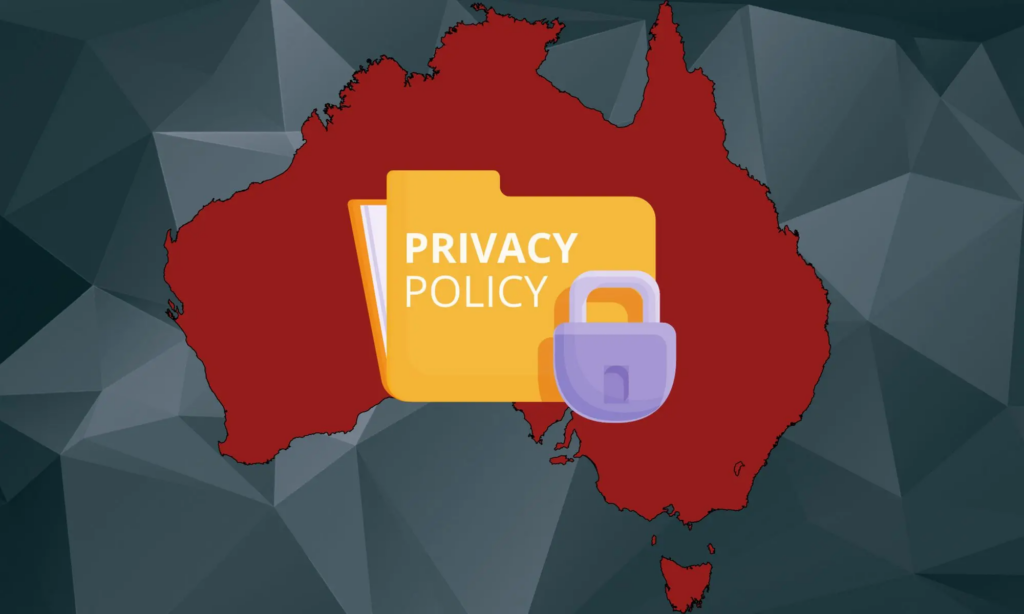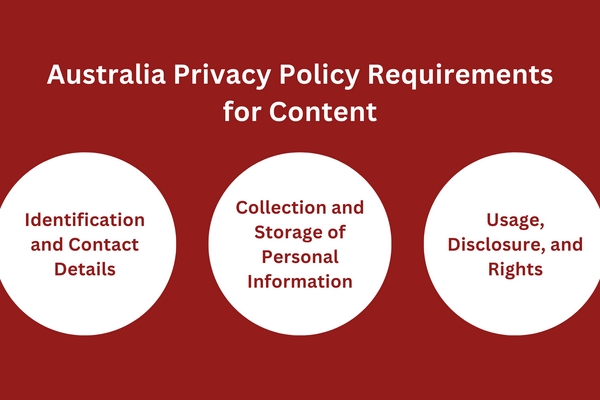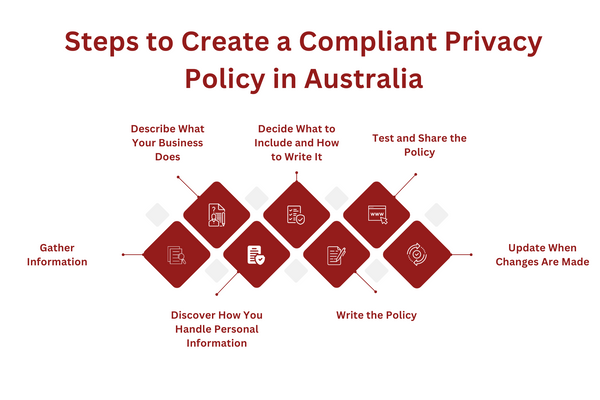
Are you on track with Australia’s privacy policy requirements? In our data-centric world, it’s super important for businesses to understand and follow these rules. This article is your guide to the must-know steps for meeting Australia’s privacy policy requirements.
We’ll talk about the Privacy Act, handling personal information, getting consent, and lots more. Whether your business is just starting or has been around for a while, this guide is for you. We’re here to make the privacy laws in Australia easy to understand and follow.
Let’s start and ensure your business is doing things the right way.
Key Takeaways
Understanding the Australia Privacy Act and GDPR: It’s crucial for businesses to know these laws and how they protect personal information and data privacy. This helps build trust with consumers.
A good policy is easy to understand and shows exactly how a business uses personal info. It’s not just about following rules but also about being open with consumers.
Keep your privacy policy up-to-date and easy for everyone to access. This shows you’re serious about privacy and respect all consumers’ needs.
What is the Australia Privacy Act Really?
13 Australian Privacy Principles What Are They.jpg

The Australia Privacy Act is a big deal, especially regarding data subject rights and data protection. It’s a rulebook for businesses on how to handle people’s personal information. This law was created in 1988 and has been amended several times to keep up with current times.
A government group called the Office of the Australian Information Commissioner is in charge of the Privacy Act. They make sure businesses are following the rules.
If your business makes more than AUD $3 million ($2 million) a year or you have people’s medical records or financial data, then you are required to follow this act.
This law matters because it helps protect personal information and ensures data privacy, which includes details like your name, address, phone number, and even medical records. The main goal is to make sure all that kind of information is treated carefully.
So, why should businesses care about this? Well, following the Privacy Act and understanding data breach implications isn’t just about rules. It’s about building trust and ensuring data protection.
When consumers know a business takes privacy seriously, they’ll feel safer and more confident. So it’s good for the business and the consumer if businesses follow the law.
Does The Australia Privacy Act Require a Privacy Policy?
The Australia Privacy Act is clear about privacy policies. If you’re running a business or a business that deals with personal information, you need to have a privacy policy. This isn’t just a suggestion – it’s a requirement under the Australian Privacy Principles (APP 1).
Your privacy policy is your promise to your consumers about how you handle their personal info, ensuring compliance with data subject rights and consent requirements.
Who Needs to Follow This Rule?
This rule isn’t for everyone, but it’s crucial for a lot of businesses. If your business falls under the APP guidelines, you need to have a privacy policy. This includes all businesses that deal with health or financial data and all private sector and not-for-profit businesses with an annual turnover of more than AUD $3 million ($2 million).
Also, some smaller businesses might need one, especially if they deal with health information or are a credit reporting body.
Why a Privacy Policy Matters
A good privacy policy is more than just rules – it shows people you care about them. Tell your consumers straight up what info you get and why so they feel OK trusting you. Be open and let people know you value their privacy, not just their data. Spell it out clearly so they know you’ve got their back.
Making Your Privacy Policy Accessible
It’s not enough to just have a policy; you need to make sure people can actually read it, which is a fundamental aspect of compliance services.
Legally speaking, you must provide your privacy policy for free in a way consumers can digest. Think about putting it on your website where it’s easy to find and consider using simple language so everyone can understand it.
Australia Privacy Policy Requirements for Content
Australia Privacy Policy Requirements for Content.png

When it comes to the Australia Privacy Act, creating a comprehensive privacy policy is not just a recommendation; it’s a requirement. This policy is a key document that outlines how your business handles personal information.
Let’s delve into the specific content requirements for your privacy policy.
Identification and Contact Details
General Info About Your Business: Your privacy policy should start by identifying your business. This means providing the name of your business and what your business does. It’s important to make this information clear and easy to find so consumers know exactly who is handling their personal information.
Contact Details: By providing your contact details upfront, you’re building trust with your consumers. It shows transparency and a willingness to be open about your data practices. This can go a long way in establishing a positive relationship with your consumers, as they know where and how to reach out if they have concerns or questions.
Including your business’s name and contact details is not just about good consumer service; it’s also a legal requirement under the Australia Privacy Act. This step ensures that you’re compliant with the law and sets a professional tone for your privacy policy.
Collection and Storage of Personal Information
What You Collect: Your privacy policy must clearly state what types of personal information your business collects. This could range from names and addresses to more sensitive information like health information. Being specific about the data you collect helps consumers understand what information they are entrusting to you.
How and Where It’s Stored: It’s equally important to explain how you collect personal information and where it is stored. Whether it’s through online forms, consumer interactions, or other means, consumers should know how their data is being gathered. Additionally, outlining where this information is stored (like in secure databases) reassures consumers about the safety of their data. Explaining the data retention period (how long you keep the data) is also an essential part.
The goal here is to be as transparent as possible. When consumers know what you’re collecting and how you’re keeping it safe, they’re more likely to trust your business. This section of your privacy policy plays a crucial role in establishing that trust.
Usage, Disclosure, and Rights
Purpose of Collection: Explain why you need to collect personal information. This could be for service delivery, marketing, or legal reasons. Consumers appreciate knowing why their data is necessary and how it benefits them.
Disclosure Practices: Be clear about how you will use and disclose personal information. If you share data with third parties, state this explicitly. Consumers have a right to know how their information is being used and who else might have access to it.
Consumers Rights: Inform consumers about their rights regarding their personal information. This includes how they can access their data, request corrections, and lodge complaints if they believe their data is mishandled. Highlighting these rights not only complies with the Privacy Act but also empowers your consumers.
Highlighting the benefits that consumers can get from providing their personal information is a great way to encourage engagement. Make sure you explain why your customers are trusting you with this data and how it will make life easier or better for them in some way.
This promotes positive relationships between businesses and consumers when done correctly, leading to more successful outcomes overall.
Australia Privacy Policy Additional Requirements
In Australia, there are some rules for privacy policies that businesses need to know. These rules make sure that your privacy policy is not just something is inaccessible but a helpful resource for everyone.
We’re going to look at three key areas: offering the policy for free, making it easy to understand, and being able to provide it in different ways.
Free of Charge
Your privacy policy shouldn’t cost consumers money. This rule means that anyone, no matter their financial situation, can access your policy. Putting it out there for free shows you’re being upfront about how you use personal info.
It’s not just following regulations to have an easy-to-find policy on your website. It proves to consumers you’re legit and care about their rights, and consumers will see you’re trustworthy if you make the policy simple to access.
Appropriate Format
Policies can be confusing when they use a bunch of legal jargon. It’s better to write policies in simple language so regular people can understand. The layout should make sense. Policies online or printed out should be clear and easy to follow from start to finish, and writing this way takes more effort.
But it’s worth it so people actually know how you use and protect their personal info, a key element in corporate compliance and data protection. Complex language might look intimidating and may leave people confused. Simpler is better if you want your policy to inform rather than intimidate.
Respond to Requests for the Privacy Policy in Different Formats
Lastly, have employees ready to offer your privacy policy in different formats if people ask for it. This could mean providing it in another language, in a format that’s accessible for people with disabilities, or even in a printed version.
Being flexible and responsive to these requests shows that you respect people’s individual needs and preferences. It’s a sign of good consumer service and demonstrates that your business values inclusivity and accessibility.
Steps to Create a Compliant Privacy Policy in Australia
Steps to Create a Compliant Privacy Policy in Australia.png

Creating a privacy policy in Australia that follows the rules, including understanding Australia Privacy Act penalties, can seem tough, but it’s really about taking the right steps.
Here’s a simple guide to help you:
Gather Information
First, look at what personal information your business handles. You might need to check how you collect and use this information. It’s like doing a check-up to see what kinds of personal info you have and how you’re dealing with it.
Describe What Your Business Does
Tell clearly what your business does, especially the parts that involve personal information. This includes the types of personal info you collect and why you need it. It’s important to be clear about this in your policy.
Discover How You Handle Personal Information
Understand how your business deals with personal information. This means knowing how you keep it safe, how you use it, and what you do if someone asks about their info or has a complaint. This helps you cover everything important in your policy.
Decide What to Include and How to Write It
Your privacy policy should cover all topics required by APP 1.4 but can be structured in a way that best suits your entity.
Focus on making the policy reader-friendly and easily navigable. Be specific about how your entity handles personal information, especially in areas of common concern like health or financial information.
Write the Policy
When writing, use clear, simple language and short sentences. The policy should be easy to navigate with helpful headings and summaries. Consider your main audience and the format of the policy, ensuring it’s suitable for online or physical distribution. Regularly review and update the policy to reflect current practices.
Test and Share the Policy
Test the policy with your target audience to ensure clarity and comprehensibility. Make the policy easily available, free of charge, and in appropriate formats, including online and physical copies if necessary.
If your policy works well and meets all of the Australia privacy policy requirements, then you can keep it.
Update When Changes Are Made
Make sure you regularly review and update the policy to keep it up-to-date. This includes changing things based on feedback or changes in practices, as well as complying with legislative changes like a new privacy law or court judgment.
Closing
So you’re probably wondering what you should do now. At Captain Compliance, we live and breathe privacy policies. We know all the ins and outs to make sure yours checks all the right boxes and is simple for the consumers to understand.
Think of us as your go-to pros for everything related to privacy policies and compliance. Whether you need some advice, want us to review yours, or even write it with you, we’ve got your back. Our goal is to not only make sure your business follows the law but also show your consumers you care about their privacy.
Are you ready to move forward but still have some questions? Get in touch with Captain Compliance today. We’re here to support you and help earn your consumers’ trust.
FAQs
What Businesses Need a Privacy Policy Under the Australia Privacy Act?
All health and financial businesses and businesses with an annual turnover of more than AUD $3 million need a privacy policy. Smaller businesses dealing with health information or credit reporting also fall under this requirement.
Wondering if your business needs a privacy policy? Check out our article here for more information!
How Often Should a Privacy Policy Be Updated?
A privacy policy should be reviewed and updated regularly, especially when there are changes in how your business handles personal information or changes in privacy laws.
Need help keeping your policy up-to-date? Reach out to Captain Compliance for expert advice!
What Should Be Included in a Privacy Policy?
Your privacy policy should clearly state the types of personal information collected, how it’s used, stored, and disclosed, and the rights of individuals regarding their personal information.
Unsure about what to include in your policy? Learn how you can create a comprehensive and compliant privacy policy here.
Can International Businesses Be Affected by the Australia Privacy Act?
Yes, if your international business deals with the personal information of Australian residents and you meet either the threshold of AUD $3 million per year or process sensitive data, you must comply with the Australian Privacy Act.